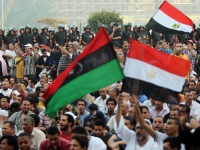Registration
You will receive an email confirming your registration.
IMGXYZ3199IMGZYXThe events of the Arab Spring have dramatically shifted the balance of power in Middle Eastern politics, effecting changes that will be increasingly apparent in the next few years. The Carnegie Moscow Center hosted a discussion with Major General (Retired) Daniel Rothschild, director of the Institute for Policy and Strategy (IPS) at the Interdisciplinary Center Herzliya, Israel, chairman of Annual Herzliya Conference Series, and a leader of the Council for Peace and Security. Carnegie Moscow Center’s Dmitri Trenin moderated.
“Islamic Spring”
Rothschild argued that there is an overall lack of structure in the movements that made up the Arab Spring, or the “Islamic Spring,” as he referred to it. He noted that Islamist groups are generally better organized than the other opposition groups that made the “Islamic Spring” possible, though both have achieved their success using a similar model—placing an emphasis on effecting change from the bottom-up and targeting a society’s youth rather than its political leaders.
Factors That Made the Islamist Movements Possible
According to Rothschild, several defining characteristics of the Middle East made the Islamist movements possible:
- Poor socio-economic situation: The biggest problem in poorer Middle Eastern countries is providing social services and employment for the growing number of young people, Rothschild stated.
- Egypt: In countries like Egypt, which adds approximately 1 million people to its population every nine months, the level of population growth in relation to socio-economic resources is unsustainable. Organized movements, such as the Muslim Brotherhood take advantage of unrest among young people and draw their base from this population.
- West Bank: Rothschild also suggested that economic growth could decrease the appeal of Islamist groups and cited the West Bank as an example. In 2010, the West Bank’s growth rate was the world’s highest at 15 percent. As GDP has grown steadily larger, Rothschild noted, Hamas’s influence in the region has decreased.
- Egypt: In countries like Egypt, which adds approximately 1 million people to its population every nine months, the level of population growth in relation to socio-economic resources is unsustainable. Organized movements, such as the Muslim Brotherhood take advantage of unrest among young people and draw their base from this population.
- The struggle between outside powers: As a result of the recent economic crisis, Rothschild explained, Western actors like the United States and the European Union have largely withdrawn from Middle Eastern politics and have allowed countries like Iran to exert greater influence. The Gulf countries, including Saudi Arabia, are wary of both the growing power of the Iranian state and the events of the Arab Spring.
- The Israeli-Palestinian conflict: The Israeli-Palestinian conflict provides a point of contention that ties together many of the aforementioned factors, Rothschild contended. With youth-driven Islamist groups like Hamas and Hezbollah continuing to receive support from Iran, and Western powers continuing their involvement in the negotiations, conflict is inevitable.
- Weak political leadership: Rothschild said the biggest problem on both sides of the Israeli-Palestinian problem is weak political leadership and the inability of the leaders to effect decisive change.
- A two-state solution: Rothschild stated that a two-state solution is necessary if Israel is to ensure that it remains both a democratic state and a Jewish one. However, Rothschild stressed that solving the Israeli-Palestinian problem will not resolve the multitude of other issues plaguing the Middle East.
- Weak political leadership: Rothschild said the biggest problem on both sides of the Israeli-Palestinian problem is weak political leadership and the inability of the leaders to effect decisive change.
Iran’s Nuclear Threat
According to Rothschild, the nuclear threat from Iran is a problem for every country within the lengthening range of its missiles. Unlike other countries with nuclear capabilities, Rothschild said, Iran lacks the system of checks and balances necessary to ensure rational decision-making.
Russia’s Role in the Middle East
Rothschild commented on Russia’s relationship with Israel and its role as a weapons supplier for many Middle Eastern nations. He stated that Israel has had very little influence over which nations Russia chose to supply with arms and that, in the Middle East, it is generally difficult to ensure that weapons end up solely in the hands of the nominal purchaser.
